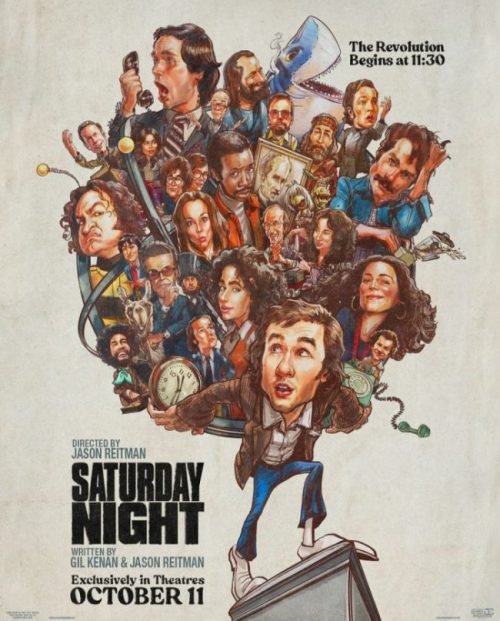Instagram |Courtesy
Jason Reitman’s latest movie is enjoyable, but marred with sexism.
Sony Pictures’ “Saturday Night,” directed by Jason Reitman, explores the wild, chaotic and occasionally violent hour and a half leading up to the first ever episode of the popular satirical show, “Saturday Night Live” (“SNL”). The movie was released to celebrate the 50 season of the late night staple and provides a dramatized look at both real and sensationalized events that happened backstage before the first episode of “SNL.”
“SNL” is a comedy show that airs, as the name suggests, live on Saturday nights at 11:30 p.m. The cast of the show consists of new and professional comedians performing a variety of different sketches, many which relate to current events, particularly politics. Sketches consist of commercial parodies, short films, songs, fake game shows and other satirical sets.
Reitman’s film captures a version of the hour and a half between 10 p.m. and 11:30 p.m. on the night of Oct. 11, 1975, in a fast-paced, frenetic movie. With an upbeat, pulsing score and a lively plot, it’s a fun, and funny, movie to watch.
The film follows “SNL” producer Lorne Michaels, played by Gabriel LaBelle, as he struggles to keep actors in line, decide a clear structure on the show and convince the rest of the world that the show will come together for prime time.
At every turn, he faces dissenters such as cast member John Belushi, played by Matt Wood, who hasn’t yet signed his contract to be on air, or NBC executive David Tebet, played by Willem Dafoe, who is almost eagerly waiting to see the show go up in flames to cancel it and replace it with a taped rerun of “The Tonight Show.”
As Matt Singer put it in his Screen Crush review of the film, the movie presents a slightly distorted and, at times, fictional representation of events. However, there have been many looks behind the scenes of both creating “SNL” and the first night of “SNL,” so the real story is hardly difficult to find.
“What you go to this film for, I suppose,” Singer said, “is energy, which ‘Saturday Night’ does have in abundance.”
The movie is able to present a version of that night with the zeal that comes from live television and a sense of nostalgia that recalls a time waiting to be shaken up with something as disruptive as “SNL.”
One part that shines in “Saturday Night” is the casting. Convincingly close interpretations of the original “SNL” cast are brought back to life with near lookalike and experienced impression actors.
One actor who really stands out is Rachel Sennott, who plays Lorne Michaels’ then wife, Rosie Shuster. Throughout the chaos, Shuster provides a grounding, encouraging presence as she aids in the production of the show. Sennott brings to life a varied, confident character who provides a sense of comedy and calm to each scene she’s a part of.
However, Shuster’s role is indicative of a larger flaw of the movie. The “SNL” original cast featured three women who would eventually become well known comedians, and each was appropriately cast. Gilda Radner, played by Ella Hunt; Jane Curtin, played by Kim Matula; and Laraine Newman, played by Emily Fairn, are well known for their contributions to “SNL” and the rise of women in comedy.
Author and historian Yael Kohen described the prominent role of Radner as an inspiration to nearly all female comedians of the following generations. Yet the movie only focuses on the male comedians and producers on the show with the women acting mainly as plot devices or comedic relief.
Shuster’s character remains the most interesting female role of the whole show, simply because she is allotted actual screen time and audiences gain an understanding of her character. Still, she spends the whole movie calming down the men around her, from Michaels to Belushi, and providing very little significance of her own.
When she isn’t patting another character comfortingly on the back, Shuster spends the rest of the movie contemplating her own complicated relationship with Michaels, a subplot that contributes practically nothing to the larger chaos and energy of the movie. None of the women add anything to the plot, save for other characters wondering if Shuster will keep her own last name or use Michaels’ last name in the end credits of the show.
The profound contrast between the exploration of the male and female characters is a remarkable disappointment. Nearly every male character’s “story” is explored and embellished, providing them with a character arc to fulfill throughout the film. It’s unfortunate that there was no similar opportunity for the female icons on the cast.
Overall, “Saturday Night” provides a fun, chaotic story of the first night of “SNL,” a cultural phenomenon. While it has its flaws, the movie provides energy and excitement that rouses nostalgia and laughter alike.
By Gabrielle Barnett


